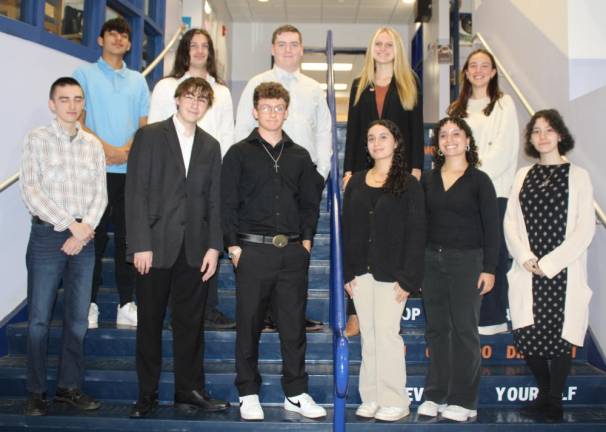Seward students get first-hand look into the world of politics
FLORIDA. This event was made possible through the Amy Bull Crist Youth-in-Government Program.

For more than two decades, students at S.S. Seward Institute have had the opportunity to look inside how local government works through the Amy Bull Crist Youth-in-Government Program.
“I joined Youth-in-Government to get a closer look at politics and see how it all works behind the scenes,” Florida Union Free School District junior Elizabeth Scheuermann said. “I have learned how government legislatures work. I have seen the voting process and the different roles that different governmental positions play.”
Wendy Anderson, who has been the adviser for the Florida program for the past decade, said about 10 to 15 students in ninth through 12th grade at Seward participate annually. The program offers students the chance to learn about the democratic process. They participate in mock conventions, propose laws through committees, run elections, and shadow-elected officials. But Youth-in-Government is for more than just those who want to hold high political office someday.
“I definitely plan to be involved in politics on a very low level. For example, maybe being on a school board,” Scheuermann said. “However, I do not plan on holding a career based solely on politics. I have other passions that I hope to hold a career in.”
The Orange County program was founded in 1944 by the county superintendent of schools for whom the program is named. Crist was inspired by Katherine St. George, a former chairman of the county Republican Committee and member of the U.S. House of Representatives, who, during a county Hi-Y Assembly in 1942, said she “found people well acquainted with national politics but woefully lacking in an understanding of how their local town and county governments functioned,” according to the program website.
Annually in October, students design a platform based on an argument or position centered on a committee: Economics, Environmental, Foreign Policy, Social, State, County, and Local government. Students then present these platforms to the other nine participating schools from other school districts across the county, and the platforms are voted on to determine the most important issues that affect young people today, Anderson said. “It is a collaborative team effort,” she said. “It is very exciting and rewarding to participate in this event.”
The Steering Convention in November mirrors the elective process of local government officials, she said. Participating students, who are members of either the Peoples Party or the Citizens Party, run for a political office, from U.S. House representative to county clerk. The candidates research the position they want to run for to determine the responsibilities of that government official, Andersen said. They then prepare speeches highlighting why they should be elected and what issues they would address and resolve. These issues could be financial, educational, environmental, security and more.
“I love getting to meet new people from other schools and hearing the [positions] that other people are passionate about,” Scheuermann said.
The student candidates present their speeches at their party’s convention before students in each party vote, and the winners are determined. Videos of the speeches from each party’s winners are viewed by all of the students in Youth-in-Government-participating high schools. The ballot is distributed, voting takes place, ballots are counted and the winners are announced.
“Even if students aren’t going into public office, the skills of presenting their ideas to a large group and debating is invaluable,” Anderson said.
In April, on County Service Day, the winning candidates shadow the Orange County official whose position they won and attend a luncheon. Winners are also rewarded with a trip to Albany to participate in state-level positions and Goshen for county positions.
“I wouldn’t say that this program has changed my views on politics,” Scheuermann said. “I still have my same opinions and political ideas; this program has just shown me how to properly express them in a way that could make a change.”
The group meets weekly in the fall, preparing for the big county events, then twice a month after the events are over.
“Civic education is important,” Anderson said. “Understanding how our government works is a great foundation for our future leaders.”